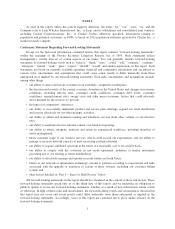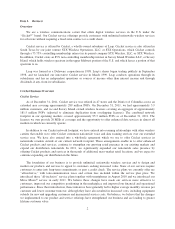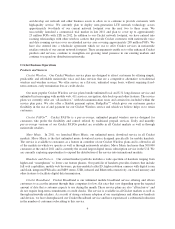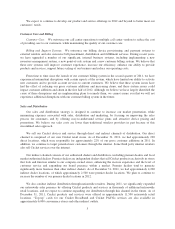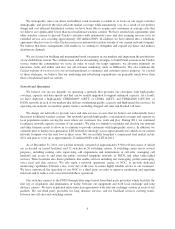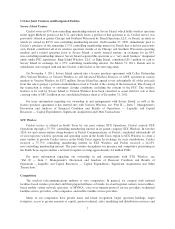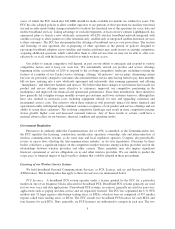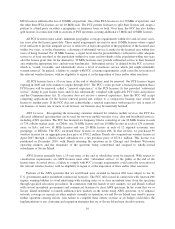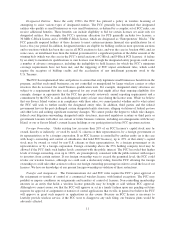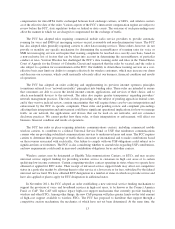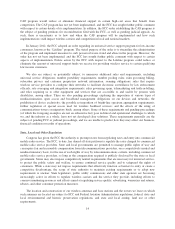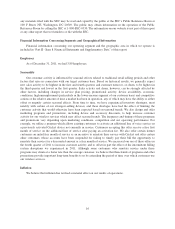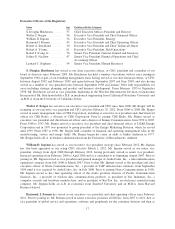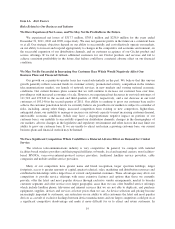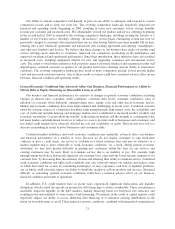Cricket Wireless 2011 Annual Report Download - page 21
Download and view the complete annual report
Please find page 21 of the 2011 Cricket Wireless annual report below. You can navigate through the pages in the report by either clicking on the pages listed below, or by using the keyword search tool below to find specific information within the annual report.Designated Entities. Since the early 1990’s the FCC has pursued a policy in wireless licensing of
attempting to assist various types of designated entities. The FCC generally has determined that designated
entities who qualify as small businesses or very small businesses, as defined by a complex set of FCC rules, can
receive additional benefits. These benefits can include eligibility to bid for certain licenses set aside only for
designated entities. For example, the FCC’s spectrum allocation for PCS generally includes two licenses, a
30 MHz C-Block license and a 10 MHz F-Block license, which are designated as “Entrepreneurs’ Blocks.” The
FCC generally required holders of these licenses to meet certain maximum financial size qualifications for at
least a five-year period. In addition, designated entities are eligible for bidding credits in most spectrum auctions
and re-auctions (which has been the case in all PCS auctions to date, and was the case in Auction #66), and, in
some cases, an installment loan from the federal government for a significant portion of the dollar amount of the
winning bids (which was the case in the FCC’s initial auctions of C-Block and F-Block PCS licenses). A failure
by an entity to maintain its qualifications to own licenses won through the designated entity program could cause
a number of adverse consequences, including the ineligibility to hold licenses for which the FCC’s minimum
coverage requirements have not been met, and the triggering of FCC unjust enrichment rules, which could
require the recapture of bidding credits and the acceleration of any installment payments owed to the
U.S. Treasury.
The FCC has implemented rules and policies to ensure that only legitimate small businesses benefit from the
program, and that such small businesses are not controlled or manipulated by larger wireless carriers or other
investors that do not meet the small business qualification tests. For example, designated entity structures are
subject to a requirement that they seek approval for any event that might affect their ongoing eligibility (for
example, changes in agreements that the FCC has previously reviewed), annual reporting requirements and a
commitment by the FCC to audit each designated entity at least once during the license term. While we believe
that our Savary Island venture is in compliance with these rules, we cannot predict whether and to what extent
the FCC will seek to further modify the designated entity rules. In addition, third parties and the federal
government have in the past challenged certain designated entity structures, alleging violations of federal qui tam
and other laws and seeking significant monetary damages. We cannot predict the degree to which rule changes,
federal court litigation surrounding designated entity structures, increased regulatory scrutiny or third party or
government lawsuits will affect our current or future business ventures, including our arrangements with Savary
Island, or our or Savary Island’s current license holdings or our participation in future FCC spectrum auctions.
Foreign Ownership. Under existing law, no more than 20% of an FCC licensee’s capital stock may be
owned, directly or indirectly, or voted by non-U.S. citizens or their representatives, by a foreign government or
its representatives or by a foreign corporation. If an FCC licensee is controlled by another entity (as is the case
with Leap’s ownership and control of subsidiaries that hold FCC licenses), up to 25% of that entity’s capital
stock may be owned or voted by non-U.S. citizens or their representatives, by a foreign government or its
representatives or by a foreign corporation. Foreign ownership above the 25% holding company level may be
allowed if the FCC finds such higher levels consistent with the public interest. The FCC has ruled that higher
levels of foreign ownership, even up to 100%, are presumptively consistent with the public interest with respect
to investors from certain nations. If our foreign ownership were to exceed the permitted level, the FCC could
revoke our wireless licenses, although we could seek a declaratory ruling from the FCC allowing the foreign
ownership or could take other actions to reduce our foreign ownership percentage in order to avoid the loss of our
licenses. We have no knowledge of any present foreign ownership in violation of these restrictions.
Transfer and Assignment. The Communications Act and FCC rules require the FCC’s prior approval of
the assignment or transfer of control of a commercial wireless license, with limited exceptions. The FCC may
prohibit or impose conditions on assignments and transfers of control of licenses. Non-controlling membership
interests in an entity that holds a wireless license generally may be bought or sold without FCC approval.
Although we cannot assure you that the FCC will approve or act in a timely fashion upon any pending or future
requests for approval of assignment or transfer of control applications that we file, in general we believe the FCC
will approve or grant such requests or applications in due course. Because an FCC license is necessary to
lawfully provide wireless service, if the FCC were to disapprove any such filing, our business plans would be
adversely affected.
11


